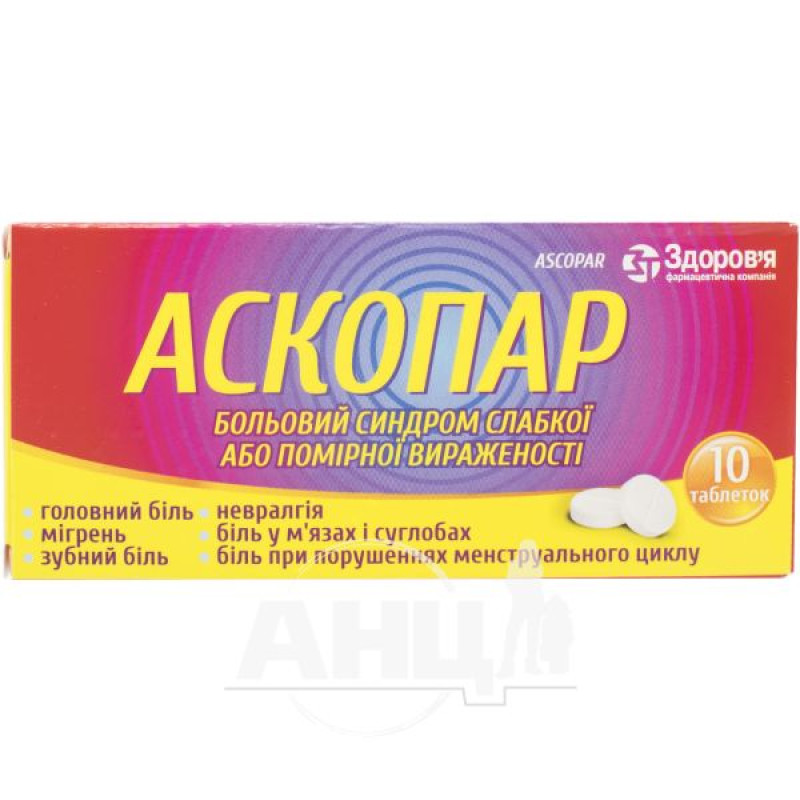Ascopar tablets blister No. 10

Ascopar tablets are indicated for pain syndrome of mild or moderate intensity (headache, migraine, toothache, neuralgia, muscle and joint pain, pain during menstrual disorders); as an antipyretic for diseases accompanied by an increase in body temperature.
Composition
Active ingredients: 1 tablet contains:
acetylsalicylic acid - 200 mg; paracetamol - 200 mg; caffeine - 40 mg;Excipients: potato starch, calcium stearate, povidone.
Contraindication
Hypersensitivity to the components of the drug, other salicylates / xanthine derivatives (theophylline, theobromine), bronchial asthma caused by the use of salicylates or other NSAIDs in history, congenital hyperbilirubinemia, congenital deficiency of glucose-6-phosphate dehydrogenase, blood diseases, anemia, leukopenia, acute gastrointestinal ulcers, hemorrhagic diathesis, severe renal / hepatic insufficiency, severe cardiovascular diseases (including arrhythmia, severe atherosclerosis, severe ischemic heart disease, severe heart failure, severe arterial hypertension), states of increased excitement, sleep disorders, old age, glaucoma, alcoholism, simultaneous use with MAO inhibitors / use of other drugs 2 weeks after stopping their use, combination with methotrexate at a dose of 15 mg / week or more.
Method of application
Adults should take 1 tablet 2-3 times a day after meals, washed down with sufficient liquid (preferably milk). The maximum daily dose is 6 tablets in 3 divided doses. The duration of treatment depends on the effectiveness of the therapy, but should not exceed 5 days as an analgesic and 3 days as an antipyretic.
Application features
Pregnant women
Not accepted.
Children
Not accepted.
Drivers
If dizziness occurs, potentially dangerous activities such as driving and/or performing work that requires increased attention and quick reactions should be avoided.
Overdose
Symptoms of paracetamol overdose: liver damage is possible when taking 10 g or more of paracetamol, which may occur 12-48 hours after an overdose. In patients with risk factors (long-term treatment with carbamazepine, phenobarbital, phenytoin, primidone, rifampicin, St. John's wort or other drugs that induce liver enzymes, regular use of excessive amounts of ethanol.
Side effects
When used in therapeutic doses, the drug is usually well tolerated.
Cardiovascular system: tachycardia, palpitations, arterial hypertension. Blood and lymphatic system: anemia, thrombocytopenia, agranulocytosis, sulfate hemoglobinemia and methemoglobinemia, as a result of the antiplatelet effect on platelets, the drug may increase the risk of bleeding. Nervous system: headache, dizziness, tremor, paresthesia, fear, anxiety, agitation, irritability, sleep disturbances, insomnia, anxiety, general weakness, tinnitus. Digestive system: dyspeptic disorders, inflammation and erosive-ulcerative lesions of the digestive tract. Skin and subcutaneous tissue: itching, rashes on the skin and mucous membranes, urticaria, angioedema, erythema multiforme, Stevens-Johnson syndrome, Lyell syndrome. Endocrine system: hypoglycemia, up to hypoglycemic coma. Immune system: hypersensitivity reactions, rhinitis, nasal congestion, bronchospasm in patients sensitive to aspirin and other NSAIDs. Digestive system: liver dysfunction, increased activity of liver enzymes, usually without the development of jaundice, hepatonecrosis.Interaction
Combination with barbiturates (reduce the antipyretic effect of paracetamol), rifampicin, salicylates, anticonvulsants (including phenytoin, carbamazepine), and alcohol should be avoided.
Storage conditions
Store in the original packaging at a temperature not exceeding 25 °C.
Keep out of reach of children.
Shelf life - 3 years.
There are no reviews for this product.
There are no reviews for this product, be the first to leave your review.
No questions about this product, be the first and ask your question.



